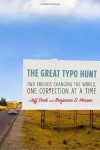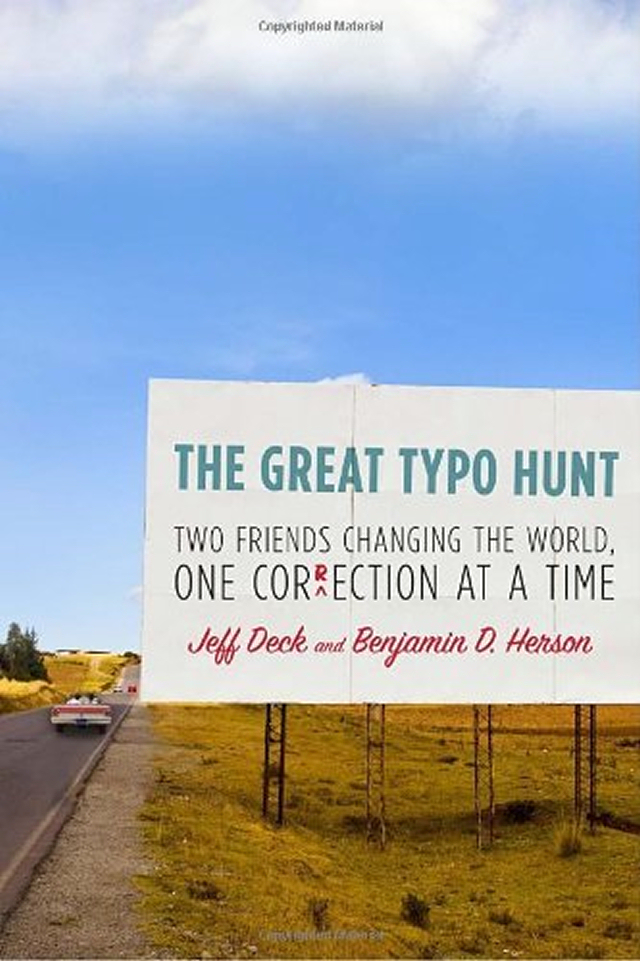
I didn’t know anything about these guys before I read the book. What I knew about it was pretty much solely from the front cover. Two friends, presumably guys, on a cross-country road trip to correct typos. It sounded cool.
It was cool. The story is told from Jeff Deck’s point of view, so I’m not sure how much of a hand Benjamin Herson had in the writing of it. At times I may say ‘he’ when it should rightfully be ‘they’. So, in this case, my next sentence was going to be: And Deck is actually pretty funny. But maybe it’s both of them that are, since they wrote it together.
Deck, and this time I do just mean him, hits on this idea of going cross-country correcting typos. I think it’s just the sort of thing a certain type of young guy decides to do. Road trip, nothing too new there. Correcting typos.. well, now you’re getting into geek territory. And I think the two of them are much more of the geek persuasion than they let come through in the text. Even references to Frodo can be passed off as literary rather than geeky.
He ropes a couple of friends, and a girlfriend he newly acquires, into joining him for parts of the trip. At the start, I could really see myself in him. He’s introverted and timid about correcting typos or telling people about typos, and really has to psych himself up for it. And then he really needs the help of a companion or two to get him started.
Along the way, he improves his character, learns lessons about life, has adventures, and all the things you’d expect of a road trip. He and Herson also get really introspective and philosophical about typos and the meaning of their whole mission and everything. And actually, parts of that when the narrative voice seemed to ramble on about it in about the middle-second half of the book, I started to lose interest. Not enough to stop reading the book entirely, but enough to momentarily stop reading. Or take a nap.
I was caught a little by surprise when, having left from Boston and traveled the Southern half the country, they wind up in LA and are giving news interviews. I was like.. what? Where did that come from? Because while he had mentioned writing in a blog, and I was sure he must have had a blog following (everyone has a blog following!), I didn’t realize that the media had caught wind of it. Apparently he’d been talking to the media since nearly the beginning. But left that out of the narrative. I felt misled.
A bit before that, when they stopped at The Grand Canyon, there was a bit of foreshadowing about legal trouble. And I was kind of wishing there that he hadn’t mentioned it. I think it would’ve had more dramatic impact for that to come out of nowhere (as the news interviews seemed to do). But apparently the book blurb, which I hadn’t read, made much of their criminal status. And since that later gained them even more media attention, I guess they assumed that anyone reading the book already knew about it. I didn’t.
By the end of the book, they’re asking ‘where do we go from here?’. And I was all on board with the idea of furthering awareness of standard written English. But then they talk about a second road trip, as if it’s a foregone conclusion that they have to do another one. And I’m left wondering.. why? Dude, isn’t the whole point of a road trip the idea that it’s a once-in-a-lifetime, life-changing journey of self-discovery and whatnot? You don’t do that twice! You go on and do something different.
So, all-in-all, I liked the first half of the book better than the second half. It made me wish I could’ve gone on this adventure with him. (All the while knowing I would’ve been miserable most of the way.) But wishing that I had at least been following the blog. I hadn’t even heard of the blog. I still have not Googled the blog.
The author blurbs at the back specifically mention ‘speculative fiction’ and ‘science fiction’. And Deck freaking worked at MIT, dude. So I know they are geekier than they let on. And I wish that had shown through more in the book. Little old geeky me thought he and his girlfriend really were playing Phase 10 in his bedroom. Until about the third mention of it. Then I got a clue. Too bad, Phase 10 is probably way cooler. I’ve never played it. Is it cool?
Albany is the third to last stop, and they have a really awful time of it there. People don’t seem to listen to them at all. And they were really down on Albany. Which I had a bit of trouble with, because I grew up just an hour north of Albany. Are upstate New Yorkers really that lax on spelling and grammar? But, but.. we have Regents exams and everything!
Especially since they then go on to lament the state of the educational system that teaches rote memorization of spelling lists. I do remember some spelling lists from my youth. I wanted more of them. We did not do that enough. Spelling was always wicked easy. Maybe I was taught the right way. I remember being taught about doubling of letters and silent e’s and the effect of both on vowels. How was I taught to write good and the people in Albany not? It ain’t that hard!
At the end of the day, I would recommend this book to readers, geeks, editors, librarians, and anyone and everyone bugged by typos. Or even those people who both lose and loose their apostrophes at the drop of a hat, and want to know what all the fuss is about. Maybe Deck and Herson will give you a clue.
A bit like a treasure hunt, I’m afraid a typo hunt wouldn’t really satisfy me on that score. It’s just too easy to find typos! It’d be like going across the country McDonalds-spotting. No challenge.
One thing I can say for the book — I could read it with some relief, safe in the knowledge that I would probably not find a single typo in it. And I didn’t. Let me know if you did.
(Postscript: I proofread this entry more carefully than I ever proofread a Triple Take review. You can thank Deck and Herson for that. But I doubt I’ll make a habit of it.)


I was also taken by surprise by the sudden arrival of the tv crews, because you’re right, it -wasn’t- made clear at all that there was media attention.
He almost completely glossed over his drive from Boston to Maryland to pick up Ben, even though later it’s revealed that he did an interview with NPR on this leg of the journey. I would have liked to see something more about that in its chronological space in the tale.
He was so careful about not mentioning his idea to any of his friends until he had it firmed up in his mind. So they wouldn’t burst his bubble, deflate his idea, talk him out of it. And yet he has no problem letting the media in before he’s even really gotten started?
Gentle folks, there are plenty of geek references in the book if you’re open to finding them. Name-checking Gygax? Mentioning Final Fantasy on page 2? Titling a chapter “Benjamin Joins the Party”? And even a veiled Katamari reference in Chapter 11…
Anyway, we’re in your corner. You’ll probably see more overtly geeky material from us in the future. :-)
Ha! I admit to laughing at the Katamari reference when I read it.
And personally, I thought the geek level was fine. The spreading of spelling and grammar geekiness was one of the points of the trip, after all. And in spite of the occasional negative reactions, I have to think it was a far better approach than the Lynne Truss-style spelling and grammar whining/elitism which tends to dominate the news and books.
Well, I do admit to not being a gaming geek, per se, so some of the gaming references would’ve gone by me.
I had to Google Gygax.
Thanks for commenting!
So it just wasn’t your -type- of geekery that was represented in the book.